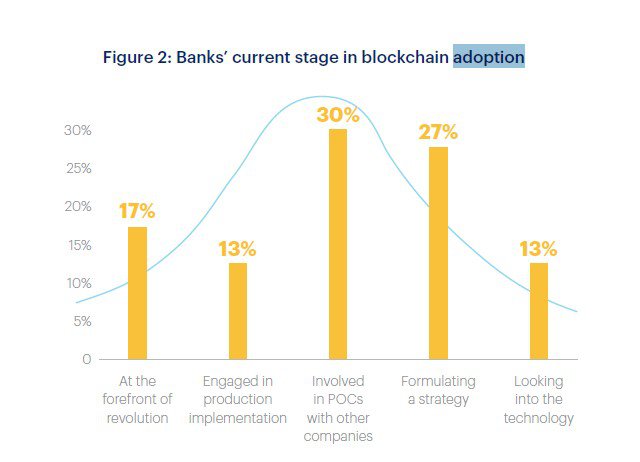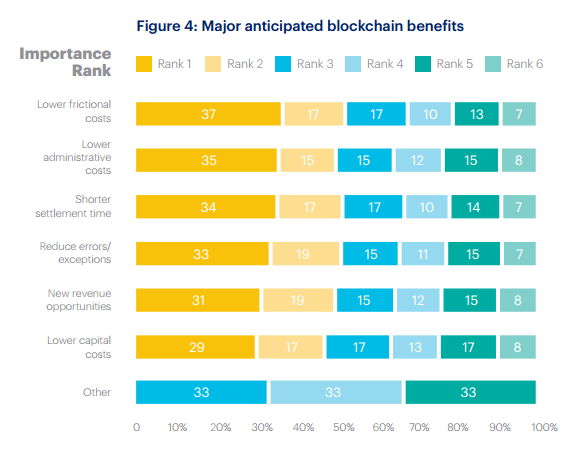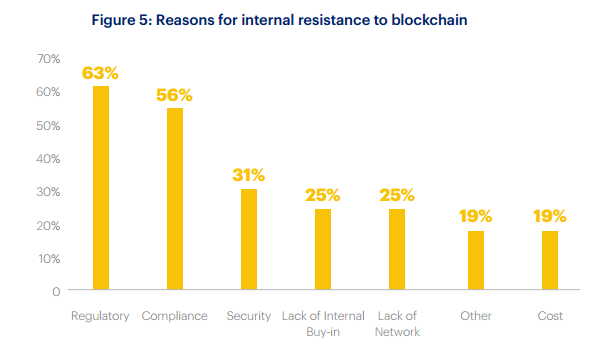90% of the largest Western banks prepare or study blockchain solutions
It seems that more and more banks are realizing that “one cannot live like that” - and are looking for opportunities to update the fairly stagnant banking industry with its slow, complex and expensive payments, manual transaction processing and many other problems using the blockchain. At least, this is precisely what the results of the Accenture study show, which revealed that nine of the ten largest US Canadian and European banks are now studying the use of blockchain in payments, writes CryptoCoinsNews.

Columbus brings blockchain to America
A study entitled “ Blockchain: How Banks Develop a Global Network of Instant Payments ” has gathered the views of 32 top banking industry executives.
30% of these banks are already creating or are going to work on prototypes of distributed payment systems. 13% of banks are already implementing developments on the blockchain. 17% of banks are already at the peak of progress, already using these solutions.

However, every tenth bank from this survey still looks at the situation somewhat differently. A Canadian bank, for example, claims that they do not have enough information to have an opinion on this. Here we could make a joke about Canada in the style of "South Park", but we will not.
Another Canadian bank went further than a simple stupor in the matter, and, exploring the capabilities of the technology, came to the conclusion that the blockchain is not suitable for processing each payment.

Mostly banks see in the blockchain a way to save on administrative costs. Next in the list of priorities is a reduction in payment time and an increase in transaction efficiency due to fewer errors. And of course, banks are studying the question of what blockchain will open up opportunities for new earnings for them. For example, what new financial services and products can be created using transactions and synchronization in real time.

Accenture analyzed the factors that impede the transition of banks to the blockchain:

The main problems of banks with the blockchain are their own procedures and the need for their significant changes for new solutions. As the researchers write, behind all this is a more global problem: the inertia of the thinking of some part of the management and shareholders of banks. Someone sees the strengths of innovation immediately, while someone needs to understand the issue in detail before they make an important decision. A lot of educational work is required so that the advantages of the blockchain become more obvious to them, and answers like: "It is not clear what is the profitability of your proposal" is less common.
Most of the participants in the study agreed that no matter what decision the banks eventually take, it should not be a closed club of the elite. Banks see truly viable solutions that will allow any non-banking structure - be it fintech startups or technology giants like Google and Apple, to be part of this ecosystem.
In another study , already conducted by IBM, adds that at least 30 out of 200 banks surveyed will work on the blockchain in 2017.
One of the most striking signs of banks' readiness for change is the move towards open source projects. The Corda blockchain developed by the R3 consortium , which unites the world's largest banks, will be included on November 30 in the Hyperledger global project launched by the Linux Foundation in December 2015 , whose task is precisely to combine the efforts of various companies to create distributed payment systems for different industries. Putting Corda in the public domain, R3 seeks to ensure that their development becomes the global banking standard.
It is already clear that after a frantic race to create blockchain solutions, standardization and development of general rules for games will be the next step in the adoption of the blockchain by the financial sector.


Columbus brings blockchain to America
A study entitled “ Blockchain: How Banks Develop a Global Network of Instant Payments ” has gathered the views of 32 top banking industry executives.
30% of these banks are already creating or are going to work on prototypes of distributed payment systems. 13% of banks are already implementing developments on the blockchain. 17% of banks are already at the peak of progress, already using these solutions.

However, every tenth bank from this survey still looks at the situation somewhat differently. A Canadian bank, for example, claims that they do not have enough information to have an opinion on this. Here we could make a joke about Canada in the style of "South Park", but we will not.
Another Canadian bank went further than a simple stupor in the matter, and, exploring the capabilities of the technology, came to the conclusion that the blockchain is not suitable for processing each payment.
- Most banks are exploring the possibility of using blockchain for intra-bank cross-border transfers.
- Two-thirds of banks are exploring blockchain capabilities for processing corporate payments.
- About half of the banks are exploring blockchain opportunities for interbank cross-border transfers.
- A third of banks are interested in how interbank cross-border transfers will work on the blockchain.
- Direct transfers between individuals excite only 21% of banks, being in fifth place.
- Below is just the management of accounts and balances as such.

Mostly banks see in the blockchain a way to save on administrative costs. Next in the list of priorities is a reduction in payment time and an increase in transaction efficiency due to fewer errors. And of course, banks are studying the question of what blockchain will open up opportunities for new earnings for them. For example, what new financial services and products can be created using transactions and synchronization in real time.

Accenture analyzed the factors that impede the transition of banks to the blockchain:

The main problems of banks with the blockchain are their own procedures and the need for their significant changes for new solutions. As the researchers write, behind all this is a more global problem: the inertia of the thinking of some part of the management and shareholders of banks. Someone sees the strengths of innovation immediately, while someone needs to understand the issue in detail before they make an important decision. A lot of educational work is required so that the advantages of the blockchain become more obvious to them, and answers like: "It is not clear what is the profitability of your proposal" is less common.
Banks go open-source
Most of the participants in the study agreed that no matter what decision the banks eventually take, it should not be a closed club of the elite. Banks see truly viable solutions that will allow any non-banking structure - be it fintech startups or technology giants like Google and Apple, to be part of this ecosystem.
Inclusiveness is an essential requirement in terms of payment development. We must be able to pay anyone, anywhere. Only interbank payments do not need anyone
- notes one of the Canadian top managers
In another study , already conducted by IBM, adds that at least 30 out of 200 banks surveyed will work on the blockchain in 2017.
Changes and the movement of the banking sector towards the blockchain is much faster than many expected,
IBM experts summarize the study.
One of the most striking signs of banks' readiness for change is the move towards open source projects. The Corda blockchain developed by the R3 consortium , which unites the world's largest banks, will be included on November 30 in the Hyperledger global project launched by the Linux Foundation in December 2015 , whose task is precisely to combine the efforts of various companies to create distributed payment systems for different industries. Putting Corda in the public domain, R3 seeks to ensure that their development becomes the global banking standard.
We want other banks and developers to create products based on our platform, and not everyone to develop their own platform, because this will lead to fragmented decisions and the impossibility of communication.
- James Carlisle, Senior R3 Developer
It is already clear that after a frantic race to create blockchain solutions, standardization and development of general rules for games will be the next step in the adoption of the blockchain by the financial sector.

